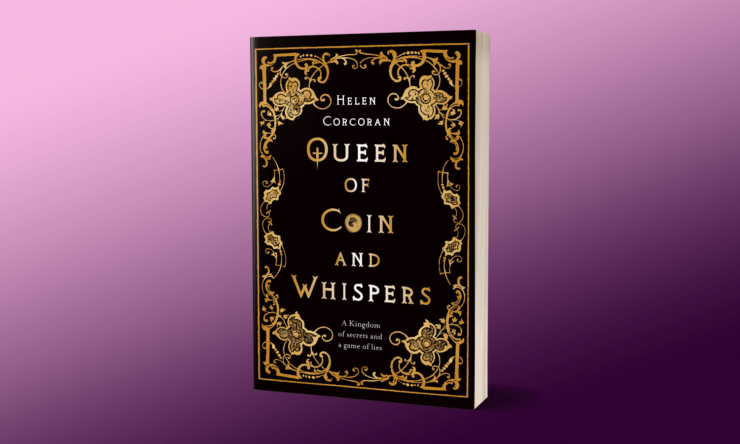The strangest thing about talking about Helen Corcoran’s debut novel is that it’s actually kind of weird that I only met her recently. We’re both from Ireland and we’re both queer women—and we attended the same alma mater—and honestly, this country’s not that big. By that rubric, it’d turn out to be dead awkward if I hated Queen of Coin and Whispers, said debut (coming in April 2020 from Irish publisher O’Brien Press): I’m nearly certain that this is the first queer fantasy with a love story featuring young women to be published from a traditional outfit here, and I have just enough local pride to want the best for it.
Fortunately, Corcoran has written a novel that could have been tailor-made to satisfy my particular narrative kinks.
I’m not sure I can tell you whether or not Queen of Coin and Whispers is good or not on quasi-objective technical grounds (it is definitely not bad), because it turns out I adored its absolute mess of a pair of ambitious, young, not as organised and on top of things as they want to be characters: Lia, who’s just inherited a throne and a kingdom with some serious economic problems going on in her treasury and a coterie of politicians dedicated to blocking her every attempt at reform; and Xania, a young woman from the lower ranks of nobility who’s convinced that one of those politicians had her father killed and who finds herself recruited, only partly voluntarily, as the new queen’s spymistress.
Their shared concerns—and their shared goals—shade into friendship despite the power differential of their situation. Both of them are awkwardly attracted to each other, which is complicated by their respective stations: Lia is expected to marry and get a heir of her own body (which means marrying a man), and Xania’s not aristocratic enough to be considered for a royal marriage even if she had the equipment to get Lia pregnant. But even though Lia is hosting several suitors for her hand, they can’t quite keep from getting in too deep with each other. And when a usurper’s plot to force Lia off the throne comes to light, it will be up to Xania to ride to her queen’s rescue—because even if Xania disagrees with Lia’s decisions, and even if they can’t stay together, she’s not going to let Lia die.
Queen of Coin and Whispers is marketed as a YA novel, but it lacks the fever-pitch intensity of emotion that I associate with strong romantic arcs in YA. (Mind you, most of the ones I’ve read involved straight couples.) For me, this is definitely a benefit: Lia and Xania’s relationship feels natural and appropriate to their characters, their mutual attraction leavened by pragmatism and an awareness of practicality. The obstacles interposed between them and a stable, lasting, happy relationship aren’t ones that can be removed through better communication, honesty, or self-knowledge: those obstacles are functions of the environment, and of the characters’ values and ambitions. I really enjoyed their journey.
Queen of Coin and Whispers sets itself in a world that draws on the political structures and constraints of Europe’s Early Modern and Enlightenment period. We don’t see much of the world outside the court, but Lia is a constitutional monarch rather than an absolute one, whose powers are bounded by the need to cooperate with parliament, and she exists in a world where some norms of political behaviour are defined by international agreements with the force of law. But surprisingly enough, this is a fantasy without magic.
Pacing-wise, Queen of Coin and Whispers feels like it rushes its political climax and conclusion. The last fifty pages wraps up events that could have comprised an entire second novel, and here are compressed very tightly—especially compared to what has gone before. (I suspect that external constraints—single volumes are less risky a sales proposition than series—may have affected the rapidity with which everything wraps up.) But it still achieves an emotionally satisfying ending.
Part coming of age, part romance, part mannered fantasy of politics, Queen of Coin and Whispers is a novel I greatly enjoyed. I look forward with interest to seeing what Corcoran does next.
Liz Bourke is a cranky queer person who reads books. She holds a Ph.D in Classics from Trinity College, Dublin. Her first book, Sleeping With Monsters, a collection of reviews and criticism, was published in 2017 by Aqueduct Press. It was a finalist for the 2018 Locus Awards and was nominated for a 2018 Hugo Award in Best Related Work. Find her at her blog, where she’s been known to talk about even more books thanks to her Patreon supporters. Or find her at her Twitter. She supports the work of the Irish Refugee Council, the Transgender Equality Network Ireland, and the Abortion Rights Campaign.










